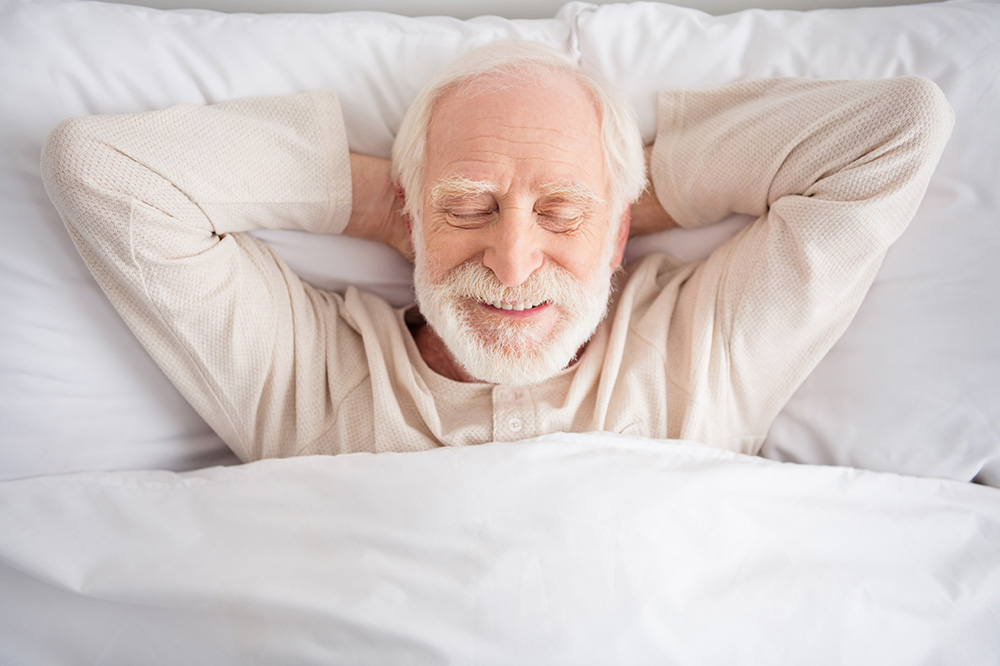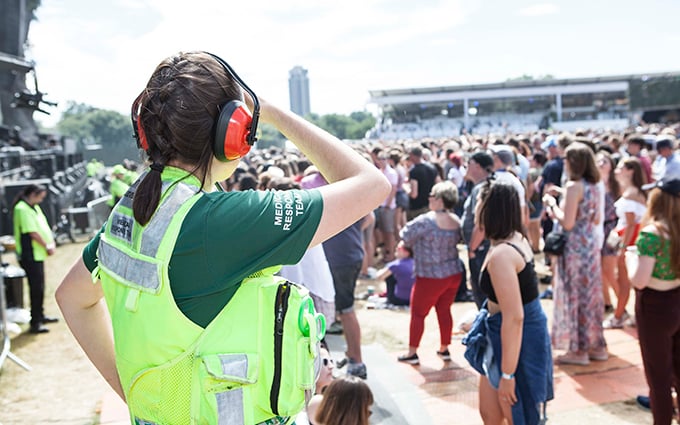Published: 24th March 2025.
Last updated: 24th March 2025.
Author: Cara Sherratt.
Contents

Why Sleep Matters for Your Mental Health
Sleep and mental health may be more connected than you think. The effects of sleep deficiency on the brain have been widely studied, and somewhat definitive answers have been produced on the negative effects on cognitive function and performance – whether you are getting too much sleep, or too little. Studies show that sleep deficiency changes activity in some parts of the brain and therefore if you're sleep deficient, you may have trouble making decisions, solving problems, controlling your emotions and behaviour, and coping with change.
Realising the potential impacts of poor-quality sleep on both mental and physical wellbeing is the first step in the journey to progressing your relationship with sleep. Researching the impact of having consistent sleep hygiene routines and implementing wind-down strategies can help to improve overall relationships with sleep when trying to combat feelings of anxiety, and depression, as well as increasing your ability to concentrate.
How Poor Sleep Can Affect Your Mental Wellbeing
Having impaired ability within the brain’s normal functions can have a direct effect on a person’s mental health – with sleep deficiency being linked to depression, suicide, and risk-taking behaviour. According to Bupa, the following guidelines for sleep volumes are as follows:
- Adults between the ages of 18 and 65 need between 7 and 9 hours of sleep
- Adults 65 and older are recommended to get between 7 and 8 hours of sleep
Even missing out on just a few hours, or a few nights’ sleep in a short period of time can leave individuals feeling irritable, sleepy and less able to cope with stress. However, having consistently poor-quality sleep or an excess of sleep over time can increase your risk of many mental health issues including depression and anxiety, on top of physical impacts on blood pressure, increased risk of stroke and decline in heart health.
Signs That Your Sleep Is Affecting Your Mental Health
When battling an ongoing lack of quality sleep, your body will start to give out some clear signals that a good night’s rest is in order. From tired, puffy eyes to skin breakouts, not having enough shut eye can impact more than you might think. But what are the potential impacts on a person’s mental health?
A brain that is sleep-deprived may be more likely to crave unhealthy snacks and meals due to impaired judgment and decision-making. Junk food desires or cravings are more likely to take over a tired brain, while foods high in fat or sugar can often make a person feel more sluggish and affect their mood. Not having enough sleep on its own can already create fluctuations in mood, with one study suggesting an increase in feelings of stress and anger in people who were getting less than 4.5 hours per night.
When someone is noticeably tired, they may often find themselves reaching for caffeinated products to keep energy levels up. A combination of a poor diet and an increase in caffeine - above the recommended daily limit of 400mg per day set by the Food Standards agency – can start to impact both mental and physical wellbeing. What’s more, is that the link between lack of sleep and depression is not only widely documented but is also considered circular. This is where one leads to another and vice-versa, making it a more difficult cycle to remedy.
However, if you’re looking to improve your general wellbeing in tandem to improving your sleep, get all the information you need in our free Introduction to wellbeing online module. Or, for a more in-depth look at how you can help support your family, friends or colleagues with their mental health why not browse or enrol on a mental health e-learning or physical courses.
Tips for Improving Sleep Hygiene and Mental Clarity
As discussed, poor sleep and poor health may be very closely related but there are some things that we can do to improve our resting periods and hopefully, in turn, improve our mental wellbeing. Luckily, there are some quick and easy ways that you can improve your sleep hygiene that you can action immediately.
Quit The Late-Night Snacking
We’ve all heard the rumours of how eating cheese and chocolate before bed can disrupt sleep with nightmares, but studies suggest that the timing of food intake in general may have a significant effect on sleep patterns. More particularly, eating in the late evening hours or nearer to bedtime may result in disruptions to healthy sleep patterns.
If you’re looking to get a decent night’s rest without the interruption of spiking blood sugars or throwing off internal body clocks, avoid the late-night snacks and any spicy foods as well as sugary or caffeinated drinks for a few hours before bedtime.
Prepare Your Room and Bed
There are several things you can consider when looking to prepare your sleeping space that can help improve your sleep quality.
Remove Surrounding Clutter
Firstly, remove any clutter that may be hanging around in your room as this may distract you from falling asleep or simply prevent you from feeling fully relaxed. A cluttered space can often reflect a cluttered mind… so they say.
Turn Off Mobile Phones & Notifications
There are several reasons to put down your mobile device to both improve mental wellbeing as well as in anticipation for a good night’s sleep. Firstly, the artificial light from all screens can disturb the body’s natural timings and make it more difficult to fall asleep. Secondly, our mobile devices act as direct communication streams at all hours of the day.
To combat being disturbed by notifications or news stories that can produce stress-like reactions, set a wind-down schedule or select specific hours to automate “Do Not Disturb” mode on your device to prevent excessive notifications coming through.
Additionally, to improve mental health overall, reflect on your relationship with your phone and the media you consume and consider whether you think this is affecting your sleep, your mental health or your stress levels more generally. Keeping your phone charging in a separate room can help you to be more mindful of your exposure to technology before bedtime, with several alternative device options for setting your alarms.
Control Your Light and Sound
Whether you are a light or heavy sleeper, it is worthwhile to consider the impacts of external light and noise that could be affecting your sleep. Cover outside light by investing in blackout blinds which may be letting the early sunrise glow into your sleeping space. For indoor lights such as TV standby buttons, use an eye mask to cover your eyes while you sleep and block out unwanted disruptions.
Using sound can be great for some individuals who need background noise to fall asleep. Noises such as rain, bird song or spa-type music can help to relax the mind as you fall asleep. However, if you are someone who is sensitive to sound, earplugs can be a great option – just make sure if you wear them regularly that you replace them often and avoid further use if any problems develop.
Additionally, if you struggle to fall asleep naturally, you could consider a body clock lamp which gradually dims light to mimic the colours of a real sunset. This can prompt your inner clock to encourage melatonin production in the brain, which in turn, can help ease you into sleep more naturally.
Practice Mindfulness and Relaxation Techniques
Mindfulness can be demonstrated in several ways when talking about sleep hygiene and improving sleep quality. Ensure you develop a nighttime routine that considers how to support the brain in its wind-down process. Choose relaxing pre-sleep activities such as reading or meditation over scrolling on phones or watching TV screens. Try to avoid heavy music or completing stressful tasks too close to bedtime and instead consider taking a warm bath or shower, which lowers your core temperature and aids in sleep, around 1-2 hours before bed.
Adjust Room Temperatures
Set the right temperature and create a perfect sleep environment. Studies suggest keeping a cooler room, some suggesting 16-18 degrees Celsius for optimal sleep. If this applies to you, consider the thickness of your sheets, turn the heating off early and consider using a fan in the warmer months. However, ideal temperatures may vary from person to person as other individuals may need a cosy warmth to drift off to. More generally, however, keeping your bedroom between 15-20 degrees should be conducive to a good night’s sleep.
Embrace Nap Time
Looking outside of our bedroom routines, it may be worthwhile understanding the benefits that short naps can have on your mental health. Short “power” naps, which should not last longer than one hour, have also been shown to help improve physical health and cognitive functions such as memory, problem-solving, focus, and creativity. This is also a great option if there is a genuine reason your sleep is being disturbed such as by young children or illness.
When approaching ways to improve your mental health, sleep can be a fantastic starting point due to the simple changes that can be implemented with ease. Even some of the smallest changes to your sleep routine can have a huge impact and take very little energy to complete. When looking to improve your mood with a few quick-wins, perhaps try looking at your sleep set ups, bedtime routines and approach to rest.
Sources
https://www.mind.org.uk/information-support/types-of-mental-health-problems/sleep-problems/sleep-and-mental-health/
https://www.nhs.uk/every-mind-matters/mental-health-issues/sleep/
https://www.bupa.co.uk/health/health-insurance/understanding-health-insurance/the-sleep-series/
https://www.bupa.co.uk/newsroom/ourviews/sleep-mental-health










